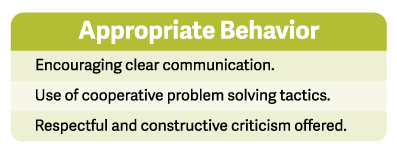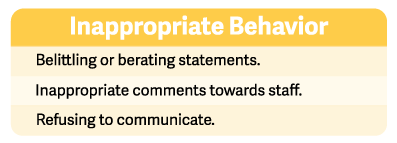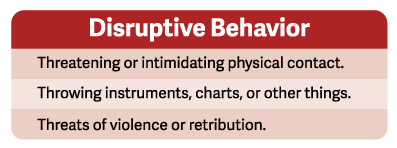When it comes to the behavior of physicians, the lines between what’s appropriate, what’s merely inappropriate and what is genuinely disruptive are not always easy to draw. Here’s how the Model Medical Staff Code of Conduct, developed by the Organized Medical Staff Section (OMSS) of the American Medical Association, explains the differences:
Appropriate Behavior
It is entirely appropriate for physicians to “advocate for patients, to recommend improvements in patient care, to participate in the operations, leadership or activities of the organized medical staff or to engage in professional practice including practice that may be in competition with the hospital.”Physicians who speak about quality concerns within their hospital or take other steps in an attempt to improve patient care and safety should be protected from retribution.
AMA’s Model Medical Staff Code of Conduct provides the following examples of appropriate physician behavior:
- Criticism communicated in a reasonable manner and offered in good faith with the aim of improving patient care and safety
- Encouraging clear communication
- Expressions of concern about a patient’s care and safety
- Expressions of dissatisfaction with policies through appropriate grievance channels or other civil
non-personal means of communication - Use of cooperative approach to problem resolution
- Constructive criticism conveyed in a respectful and professional manner, without blame or shame for
adverse outcomes - Professional comments to any professional, managerial, supervisory, or administrative staff, or members of the Board of Directors about patient care or safety provided by others;
- Active participation in medical staff and hospital meetings (i.e., comments made during or resulting from such meetings can not be used as the basis for a complaint under this Code of Conduct)
- Membership on other medical staffs
- Seeking legal advice or the initiation of legal action for cause.

Inappropriate Behavior
Inappropriate behavior is conduct that is unwarranted and is reasonably interpreted to be demeaning or offensive. This behavior can have a detrimental effect on relationships between healthcare practitioners. Inappropriate behavior includes such things as:
- Belittling or berating statements
- Use of profanity or disrespectful language
- Inappropriate comments written in the medical record
- Deliberate failure of cooperation without good cause
- Refusal to return phone calls, pages, or other messages concerning patient care or safety.
Persistent, repeated inappropriate behavior can become a form of harassment and thereby rise to the level of disruptive behavior.

Disruptive Behavior
In keeping with E-9.045, the OMSS model code defines disruptive behavior as any abusive conduct, including sexual or other forms of harassment, or other forms of verbal or nonverbal conduct that harms or intimidates others to the extent that quality of care or patient safety could be compromised. Disruptive physician behavior includes, but is not limited to:
- Physically threatening language directed at anyone in the hospital including physicians, nurses, other medical staff members, or any hospital employee, administrator or member of the Board of Directors
- Physical contact with another individual that is threatening or intimidating
- Throwing instruments, charts or other things
- Threats of violence or retribution
- Sexual harassment
- Other forms of harassment including, but not limited to, persistent inappropriate behavior and repeated threats of litigation.
“Because of the detrimental effects on patient care and the ability to work with other members of the health care team, disruptive behavior by a physician should not be tolerated.”1

For more on disruptive behavior by physicians and how to deal with it, see our article “How to Successfully Manage the Obstacles of a Disruptive Physician.”
In need of assistance and searching for additional resources regarding disruptive physicians? We can help. Visit our Physician Intervention page or contact us today.



